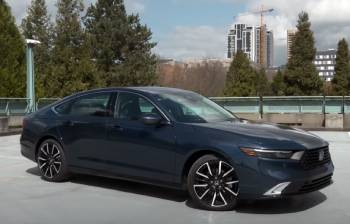When it comes to hybrid sedans, two names often pop up in the conversation: Honda Accord Hybrid and Toyota Camry Hybrid. Both cars come from reputable manufacturers and have carved out a niche in the hybrid sedan segment.
So, how do you pick between these two giants? Let’s dive into an analytical comparison, so you can make an informed choice.
A Brief Comparison Table
| Feature/Aspect | Honda Accord Hybrid | Toyota Camry Hybrid |
| Engine | 2.0-liter four-cylinder + electric motor | 2.5-liter four-cylinder + electric motor |
| Performance Feel | Sportier | Comfort-focused |
| Interior Quality | Higher-end materials | Quality materials |
| Infotainment System | Intuitive and responsive | Functional but can be clunky |
| Safety Features | Honda Sensing suite | Toyota Safety Sense suite |
| Design Language | Modern, sleek | Elegant, conservative |
| Reliability | Very reliable | Extremely reliable |
Honda Accord Hybrid

Pros:
- Performance:
Honda has always been known for its spirited engines, and the Accord Hybrid is no exception. With its combined output, you get both power and efficiency, making city and highway driving a breeze.
- Interior Quality:
Stepping inside the Accord Hybrid, one can’t help but notice the plush materials and well-thought-out ergonomics. The attention to detail screams luxury.
- Infotainment System:
Honda’s infotainment system is intuitive and user-friendly. The touch response is seamless, ensuring you’re always connected and entertained.
Cons:
- Trunk Space:
Because of the battery’s placement, you get slightly less trunk space compared to non-hybrid Accord models.
- Price:
The Accord Hybrid is a bit pricier upfront compared to some competitors in its segment, although many argue its value proposition justifies the cost.
- Driving Dynamics:
While it’s no slouch, some users have pointed out that the Accord Hybrid doesn’t feel as engaging as its non-hybrid counterpart.
Also Read: Is Having AAA Tire And Wheel Insurance Wise?
Toyota Camry Hybrid

Pros:
- Fuel Efficiency:
The Camry Hybrid boasts impressive fuel efficiency numbers. For those looking to maximize their mileage, it’s hard to beat.
- Reliability:
Toyota has a long-standing reputation for producing reliable cars, and the Camry Hybrid upholds that tradition.
- Safety Features:
Toyota’s Safety Sense suite, which comes standard on the Camry Hybrid, offers a comprehensive set of advanced safety features.
Cons:
- Infotainment Interface:
Some users find Toyota’s infotainment system a bit clunky and less intuitive than competitors.
- Exterior Design:
While design is subjective, a segment of users finds the Camry Hybrid’s styling a bit too conservative.
- Engine Noise:
Under hard acceleration, the engine can get noisy, which can be a bit intrusive for some.
Also Read: Basic Differences Between F-350 Insurance And F-450 Insurance.
Key Differences Between Honda Accord Hybrid and Toyota Camry Hybrid
Both the Honda Accord Hybrid and the Toyota Camry Hybrid are exceptional vehicles in the hybrid sedan market. They offer an incredible blend of performance, fuel efficiency, and comfort. However, they do have distinct differences. Let’s break them down.
- Performance and Driving Experience
Honda Accord Hybrid:
The Accord Hybrid is all about balancing fuel efficiency with performance. It uses a 2.0-liter four-cylinder engine combined with an electric motor. This setup provides a combined horsepower that is commendable and offers a smooth driving experience, especially on highways.
Additionally, the Accord Hybrid has a slightly sportier feel, which appeals to drivers who enjoy a spirited drive.
Toyota Camry Hybrid:
Toyota’s Camry Hybrid leans more towards comfort. It utilizes a 2.5-liter four-cylinder engine in tandem with an electric motor.
While its horsepower is in the same ballpark as the Accord, its power delivery focuses more on ensuring smooth, quiet operation. It’s less about sportiness and more about serene driving.
- Interior and Comfort
Honda Accord Hybrid:
Honda has pulled out the stops when it comes to the Accord Hybrid’s interior. The materials feel plush and luxurious. Ergonomically, everything feels right where it should be, from the placement of controls to the comfort of the seats.
The infotainment system is intuitive, making it easy for drivers and passengers to control audio, navigation, and other features.
Toyota Camry Hybrid:
The Camry Hybrid also offers a comfortable and aesthetically pleasing interior. Seats are cozy, and there’s ample space for both front and rear passengers.
However, while its materials are of high quality, some might argue they’re not as upscale as those in the Accord.
- Technology and Infotainment
Honda Accord Hybrid:
Honda’s infotainment system is known for its user-friendliness. With Apple CarPlay and Android Auto integration, drivers can seamlessly connect their smartphones. The touch response is also quicker, ensuring a more enjoyable user experience.
Toyota Camry Hybrid:
Toyota’s system, while functional, has faced criticism for being a tad clunky. It does integrate smartphone capabilities, but its response times and menu layouts are sometimes considered less intuitive than Honda’s.
- Safety
Honda Accord Hybrid:
Honda has equipped the Accord Hybrid with the Honda Sensing suite, a comprehensive set of safety features, including adaptive cruise control, lane-keeping assist, and collision mitigation braking.
Toyota Camry Hybrid:
Toyota isn’t left behind in safety tech either. With the Toyota Safety Sense suite, Camry Hybrid drivers get a similar set of advanced safety features, including pedestrian detection and lane departure alert.
- Design and Aesthetics
Honda Accord Hybrid:
The Accord Hybrid carries Honda’s modern design language, with sleek lines and an aggressive front grille. Its design appeals to those who prefer a contemporary look.
Toyota Camry Hybrid:
Toyota has historically been conservative with the Camry’s design. However, recent models have adopted a bolder look. Still, it’s less aggressive than the Accord, leaning more towards elegance than sportiness.
- Reliability and Maintenance
Honda Accord Hybrid:
Honda is renowned for its reliable vehicles, and the Accord Hybrid is no exception. Owners can expect fewer trips to the mechanic.
Toyota Camry Hybrid:
Toyota’s reputation in reliability is arguably unmatched. The Camry Hybrid is a testament to this, with many owners reporting minimal issues over extended periods.
Frequently Asked Questions (FAQs)
Absolutely, especially if you value a blend of performance with efficiency, top-notch interior quality, and an intuitive infotainment system. It’s a car that offers a premium feel without the luxury car price tag.
While they share the same body and many features, the main difference lies in the powertrain. The hybrid combines a gasoline engine with an electric motor, optimizing fuel efficiency and reducing emissions.
It indicates that the car combines a gasoline engine with an electric motor to achieve better fuel efficiency and reduce carbon emissions. It seamlessly transitions between these power sources based on driving conditions.
The main difference lies in aesthetics and some features. The Hybrid Sport tends to have sportier exterior elements and might come with additional features that the standard Hybrid doesn’t offer.
One notable disadvantage is the reduced trunk space due to battery placement. Also, hybrids generally come with a higher upfront cost, though you often recoup this through fuel savings.
Honda’s hybrid batteries are designed to last a long time, often the life of the car. The warranty for these batteries is typically 8 years or 100,000 miles, though many have reported them lasting well beyond this timeframe.
Conclusion
Choosing between the Honda Accord Hybrid and Toyota Camry Hybrid is no easy task. The Accord shines with its premium feel and performance, while the Camry stands out for its unbeatable reliability and fuel efficiency.
Ultimately, your personal preferences and priorities will guide your decision. Either way, you’re making a stellar choice in the hybrid sedan segment.



